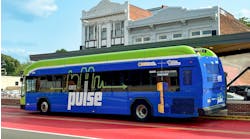MBTA Prepares for Youth Pass Launch
The Massachusetts Bay Transportation Authority's (MBTA) Fiscal and Management Control Board on Monday reviewed preparations for the scheduled February launch of the MBTA's Youth Pass program, which will help provide affordable transit access for low-income young people.
The Youth Pass is a card that holders can use at MBTA Fare Vending Machines or at retail sales terminals to purchase a reduced-price LinkPass for $30 a month. It can also be used by holders to add stored value onto the card and ride the T's bus and subway systems at the reduced fare rate. However, the Youth Pass does not provide a reduced fare on the Commuter Rail.
"The Youth Pass will enable young people to access jobs, school, and the civic opportunities available to them in the Commonwealth," said MassDOT Secretary and CEO Stephanie Pollack. "This will strengthen the connection between transit and opportunity."
"Extending the Youth Pass program to this cohort of our ridership can make a huge difference in the lives of young people who rely heavily on public transportation to get to school or extracurricular activities or jobs," said MBTA General Manager Brian Shortsleeve.
In order to qualify, one must:
- Not be enrolled in middle or high school (these students may receive a Student CharlieCard through their school - contact your school for more information)
- Be born after November 1, 1991
- If you were born after November 1, 1991, but before November 1, 1997, you must also show that you are enrolled in one of the MBTA's accepted GED or job training programs or state/federal income based benefit program
- Live in a participating city or town (currently Boston, Chelsea, Malden, or Somerville)
The Youth Pass card is distributed through the MBTA's municipal and community partners. In order to join the Youth Pass program, once a year young people will have to fill out an application and bring it along with required documentation to their city for verification. All Youth Pass cards expire on November 1 and require re-enrollment.
The program was initially tested as a year-long pilot that provided monthly passes to 1,500 youth between the ages of 12 and 21 in the cities of Boston, Somerville, Chelsea, and Malden. The pilot collected data to evaluate the benefits to youth, costs, and the feasibility of having partners administer reduced fare products.


